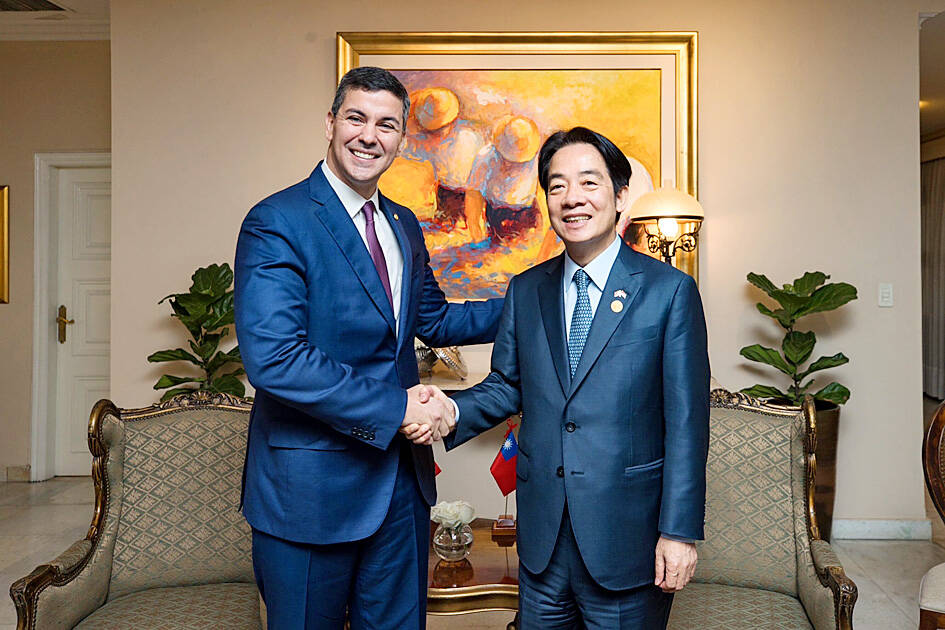Paraguayan President Santiago Pena has pledged to continue enhancing cooperation with Taiwan, as he and Japanese Prime Minister Fumio Kishida expressed opposition to any unilateral change to the “status quo” in the Taiwan Strait using force, Japanese media reported on Saturday.
Kishida yesterday completed a trip to France, Brazil and Paraguay, his first visit to South America since taking office in 2021.
After the Japanese leader and Pena spoke for more than an hour on Friday, exchanging views on the situation in East Asia in the face of China’s increasing military pressure on Taiwan, they affirmed that “unilateral attempts to change the status quo by force will not be tolerated,” the Yomiuri Shimbun reported.

Photo courtesy of the Presidential Office
Pena mentioned Taiwan during a joint news conference after their meeting.
“We have a long diplomatic relationship with Taiwan. We would like to continue to promote a wide-ranging cooperative partnership,” the Fuji News Network quoted Pena as saying.
The leaders agreed to work together to maintain and bolster a free and open international order, the Yomiuri Shimbun reported.
The importance of relations between Japan and Paraguay, which shares its values of freedom, democracy and the rule of law, is increasing as the international community faces a number of crises, the paper quoted Kishida as saying.
The Paraguayan president also reaffirmed robust ties with Taiwan during an interview with the Yomiuri Shimbun on Thursday, saying that the South American country’s stance on Taiwan is unwavering.
He also said that the firmer his country is on maintaining relations with Taiwan, the more pressure it receives from other countries to break those ties.
For example, Brazilian President Luiz Inacio Lula da Silva repeatedly suggested that Asuncion establish diplomatic relations with Beijing, he said.
During Paraguay’s presidential election last year, opposition candidates called for diplomatic ties with Taiwan to be severed, he said.
Some of the strongest opposition came from the domestic agricultural sector, as despite being a major exporter of soybeans and beef, Paraguay is unable to export beef to China and has to rely on third-party countries such as Argentina to export soybeans, he said.
Paraguay’s relationships with Japan and the US should serve as a backup force to help the country withstand pressure from home and abroad to switch recognition from Taipei to Beijing, Pena said.
“Supporting Paraguay is supporting Taiwan,” he added.
He said he hopes to prove that maintaining diplomatic relations with Taiwan is in the interest of his country, which can serve as an example for other countries to follow.

The Taiwanese passport ranked 33rd in a global listing of passports by convenience this month, rising three places from last month’s ranking, but matching its position in January last year. The Henley Passport Index, an international ranking of passports by the number of designations its holder can travel to without a visa, showed that the Taiwan passport enables holders to travel to 139 countries and territories without a visa. Singapore’s passport was ranked the most powerful with visa-free access to 192 destinations out of 227, according to the index published on Tuesday by UK-based migration investment consultancy firm Henley and Partners. Japan’s and

NATIONAL SECURITY THREAT: An official said that Guan Guan’s comments had gone beyond the threshold of free speech, as she advocated for the destruction of the ROC China-born media influencer Guan Guan’s (關關) residency permit has been revoked for repeatedly posting pro-China content that threatens national security, the National Immigration Agency said yesterday. Guan Guan has said many controversial things in her videos posted to Douyin (抖音), including “the red flag will soon be painted all over Taiwan” and “Taiwan is an inseparable part of China,” while expressing hope for expedited “reunification.” The agency received multiple reports alleging that Guan Guan had advocated for armed reunification last year. After investigating, the agency last month issued a notice requiring her to appear and account for her actions. Guan Guan appeared as required,

Japan and the Philippines yesterday signed a defense pact that would allow the tax-free provision of ammunition, fuel, food and other necessities when their forces stage joint training to boost deterrence against China’s growing aggression in the region and to bolster their preparation for natural disasters. Japan has faced increasing political, trade and security tensions with China, which was angered by Japanese Prime Minister Sanae Takaichi’s remark that a Chinese attack on Taiwan would be a survival-threatening situation for Japan, triggering a military response. Japan and the Philippines have also had separate territorial conflicts with Beijing in the East and South China

A strong cold air mass is expected to arrive tonight, bringing a change in weather and a drop in temperature, the Central Weather Administration (CWA) said. The coldest time would be early on Thursday morning, with temperatures in some areas dipping as low as 8°C, it said. Daytime highs yesterday were 22°C to 24°C in northern and eastern Taiwan, and about 25°C to 28°C in the central and southern regions, it said. However, nighttime lows would dip to about 15°C to 16°C in central and northern Taiwan as well as the northeast, and 17°C to 19°C elsewhere, it said. Tropical Storm Nokaen, currently